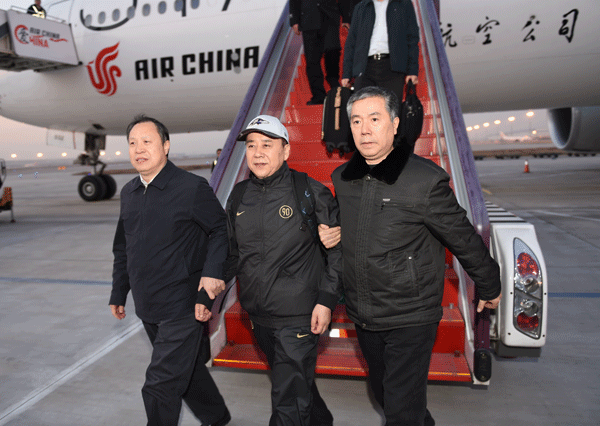Since becoming China’s top leader more than three years ago, President Xi Jinping has vowed to crack down on both “tigers” and “flies”–low-level government officials and Party elites–in a nationwide anti-corruption campaign. As a part of this war against graft, Chinese authorities have been actively seeking the cooperation of foreign governments in repatriating corrupt officials who fled overseas. Some countries have been reluctant to comply, citing concerns about treatment of prisoners and fairness of trials. But a recent statement by the Party’s Central Commission for Discipline Inspection accused such nations of using human rights as an “excuse” for refusing to send back fugitives. Catherine Lai at Hong Kong Free Press reports:
It accused “some people” in the international community of having a double standard and emphasising corruption cases as proof of “stains on the system,” while protecting corrupt officials.
These people “use law and human rights as excuses, objectively providing a haven for the corrupt and taking their ‘black money,’” said the post.
It called for doing away with the double standard, saying “[corrupt fugitives] are criminals. Whether for China or the countries they are in, this is still unacceptable according to related international laws.” [Source]
The CCDI has also called on China to try fugitives in absentia to help persuade host governments of their guilt. Catherine Wong at South China Morning Post reports:
Setting up trials in absentia – criminal proceedings in court in which the suspect is not physically present – would help China to better cooperate with other countries in hunting suspects, the Central Commission for Discipline Inspection said on its website on Monday.
[…] The mainland’s criminal law does not cover trials in absentia. But in the past few years, academics and media commentators have called for such procedures to boost anti-corruption efforts.
China was often asked to submit evidence or statements from a court ruling when it asked other countries to help in repatriating fugitives, Zhuang Deshui, deputy director of the Clean Government Centre at Peking University, said.
“With trials in absentia, China would be able to establish the suspect’s status as a criminal,” he said. [Source]
Meanwhile, the Chinese government said last week that a man on its list of 100 most-wanted corruption fugitives has voluntarily returned from Canada. From Ben Blanchard at Reuters:
In a brief statement, China’s graft-fighting Central Commission for Discipline Inspection said Zeng Ziheng had come back to the country of his own accord after “successful admonishment”.
It gave no details of how that was achieved, but said China’s justice and foreign ministries assisted.
Zeng, 44, had been an engineer in the northern province of Henan. The statement provided no details of the exact crimes he is wanted for. [Source]
Hundreds of officials at all levels of government have been investigated since Xi’s anti-corruption drive began, including many of Xi’s political rivals such as former security czar Zhou Yongkang. This has fueled speculation that Xi is using the campaign not only to fight corruption but also to undermine his political foes and consolidate power. At Nikkei Asian Review, Katsuji Nakazawa looks at the recent fall of top Jiangsu official Li Yunfeng and what it may signal for Xi’s remaining rivals:
“Xi has now set his sights on a big tiger,” one source said. “Something terrible could happen.”
The Central Commission for Discipline Inspection, the Chinese Communist Party’s top anti-graft body, announced on May 30 that Li Yunfeng, the vice governor of Jiangsu Province, has been placed under investigation for serious disciplinary violations.
[…] By detaining Jiangsu “tiger” Li Yunfeng, Xi is pressuring former President Jiang’s group, known as the Shanghai faction, as well as the Communist Youth League faction.
These factions have strong influence in Jiangsu. Besides being a close aide to Li Yuanchao, Li Yunfeng has personal connections with the Shanghai faction.
President Xi wants to prevent the two factions from forming a united front against him. This is why Jiangsu is again bearing the brunt of Xi’s anti-corruption crusade. [Source]
Elsewhere, Jun Mai at South China Morning Post reports that a high-level official in Guangdong committed suicide over the weekend, likely due to his connection with an ongoing graft probe in the province. In a separate post, Mai writes that PLA singer Tang Can has resurfaced after mysteriously disappearing five years ago, having served a previously unreported prison sentence for corruption.
The CCDI is responsible for enforcing ideological discipline as well as fighting corruption. Last week it raised eyebrows by accusing the Party’s Central Propaganda Department and the State Administration of Press, Publication, Radio, Film and Television of holding the media, internet, and universities in an insufficiently firm grip.
At Bloomberg, meanwhile, researchers found evidence that Xi’s anti-corruption drive has not adversely affected the country’s economy as critics alleged, citing economic trends in Hainan where growth has slowed less than average despite an extensive crackdown on officials in the region.








